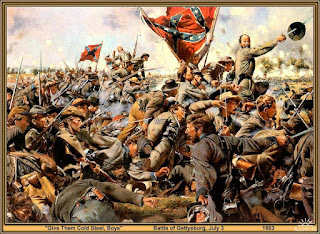Human nature is often overlooked when politics is involved. When an agenda is pushed or a narrative is preferred that is all that matters and actually thinking things through gets lost in the mix. All too often we are told that all Southrons were fighting for slavery. This overlooks the fact that not all Southern men/women owned slaves and that, as is the case today, a class of rich people, plantation owners, were the ones making political decisions for the new nation. The average Southern fighting man was in the field for vastly different reasons than the elite class of plantation owners.
The question then becomes - "What are men willing to die for?" Why would they have made the sacrifices they made during the Late Unpleasantness? Was it so that a rich plantation owner could keep his slaves? That's not something I would risk life and limb for, but maybe that's just me. As an example of the sacrifices made I offer this video and point you to July 3, 1863, as just one example. When George Pickett's Virginians marched across one-mile of open ground toward a copse of tress on Cemetery Ridge near a little town called Gettysburg, PA.
The rear echelon ranks of that division of infantry watched as those before them were torn into pieces by grapeshot (Golf ball sized lead balls grouped together that would spread after leaving the barrel of a cannon) and canister from Union artillery. Where before stood men there was now a red mist in the air and body parts strewn about the ground. They watched, they heard, and yet they kept moving forward. As they got closer the Union gunners switched to DOUBLE CANISTER. Canister was a round about the size of a can of Hi-C juice, filled with small lead balls about the size of marbles. I want you, just for a moment, to imagine the devastation and carnage such a round could cause coming out of a 12-pounder cannon. Now double that.
Yet these men kept moving forward. Despite what they had seen, in spite of what they knew was going to happen to them, they kept moving forward. In this video I have attached you can get some idea of what it might have been like. Watch and learn. After watching, after considering what those men were up against, knowing now that they did not waver, but kept moving forward to certain death, you should ask yourself - Would they do that so a rich man could keep his slaves? Would you? I know I wouldn't. So why were they there? What were they fighting for? What would human nature, then and now, dictate as a reason for such a sacrifice? These are things you might want to consider before condemning an entire section of a nation as "fighting for slavery."


